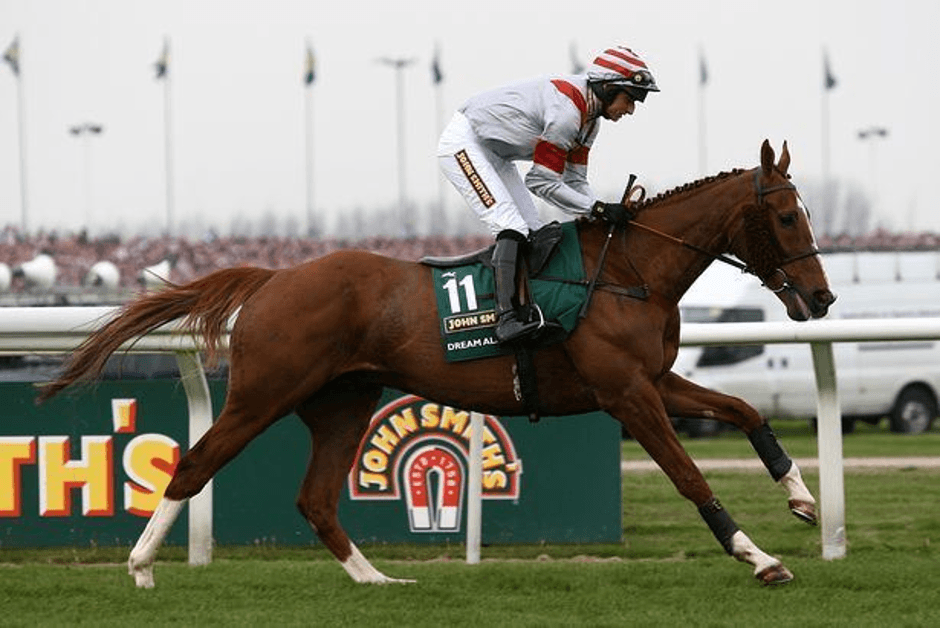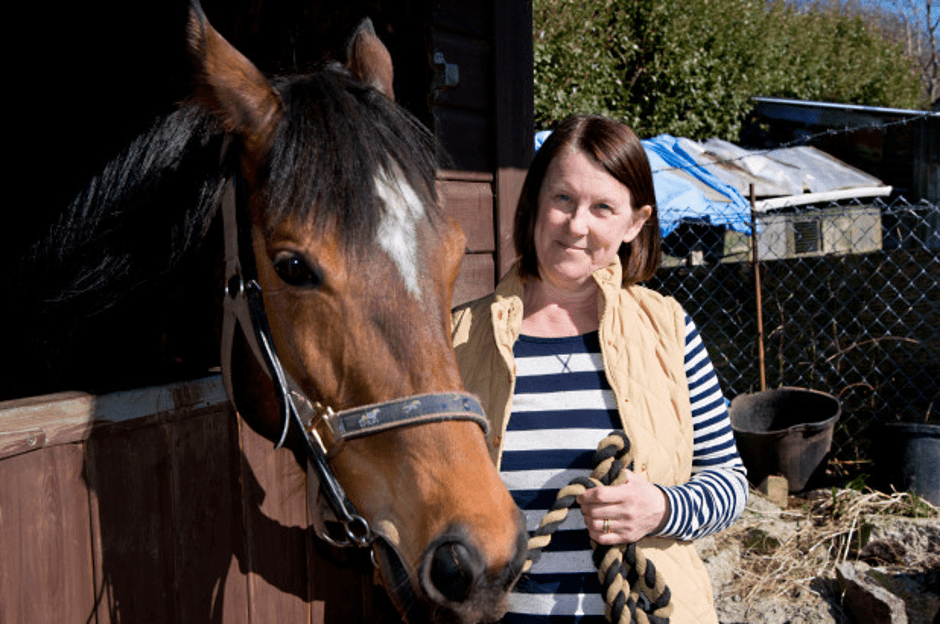
It started out as one persons dream; it became a whole community’s heart warming reality.
Janet Vokes achieved everything she put her mind to; she had bred prize winning Whippet dogs, raced successful pigeons and after overhearing a chance conversation in the pub she worked in from a gentleman, Howard Davies, who had previously been in a syndicate, she set her mind to breeding a Champion racehorse; with no experience at all.
Howard was not going to give in lightly, however. Janet rang him regularly asking him to help her set up a syndicate and after many conversations, he finally agreed. An advertisement was placed in the pub where Janet was working looking for members to join the Syndicate for £10 a week. After many conversations and persuading, ‘The Alliance Partnership’ was born.

“Horses are very intelligent, and they pick up on your moods. They’re wonderful, they really are levelers and they keep your feet on the ground.”
First up on the journey to breeding a champion, a brood mare had to be found. Janet and Brian searched far and wide and were eventually informed of a mare for sale called Rewbell, for £1000; after visiting her at home and seeing her, the couple managed to haggle her down to just £350. Knowing very little about breeding other than the Welsh Cobs they had bred at home, Janet had no clue or experience where to go next. Retired vet, Ron, helped in every way imaginable; with all the paperwork, information and his expertise that he could provide. Eventually Rewbell was sent to be covered by the sire Bien Bien for a stud fee of £2000.
Watching Dream grow on the allotment, the excitement gradually built for the syndicate, now realizing it was potentially more than just a pipe dream… it was becoming a reality.
When he became of age, Philip Hobbs and Nigel Twiston-Davies were the front runners for choice of trainers, and it was yet to be seen if he had the natural skill to become a racehorse. Janet wrote to Philip seeing if he would consider training Dream and became the choice trainer for the syndicate. His incredible yard and facilities on the coast in Minehead seemed the perfect place for him to reach his potential.
After deciding he was good enough to have a go, Dream’s first run was at Newbury in November 2004, where he came a well respected fourth. Philip told Janet that Dream had promise and he was gelded before a 350 day break and in October 2005 at Cheltenham he roared into second place, a third at Newbury the next month.
It was written in the stars when he had his first win at Chepstow, where later his fairy tale story would reach fever point. In December 2007, Dream Alliance took on the mighty Denman and came second to him in The Hennessy Gold Cup at Newbury.
Following a catastrophic injury of a sliced tendon at the Aintree Festival, Dream was close to being euthanized and it was only because of the quick thinking of his jockey that he was saved. He then underwent pioneering stem cell surgery from a research university and, incredibly, this surgery worked and he healed. After 15 long months of rehabilitation and surgery, Dream was able to race again. Achieving second place at Chepstow in November of 2009, just a month and a half he went one better; Janet poignantly described the moment Dream defied the impossible won the Coral Welsh National at Chepstow:
“When we were watching him, it was like watching it in slow motion watching him go over the line! It was like being in a bubble, I was thinking has he just won!? It took a little while to sink in and of course my father died in the march before Dream started racing again after his accident. When we used to go racing, the first thing I used to do was phone my dad no matter what to tell him how he’d done. Both my parents were housebound. My dad used to follow Dream but never used to follower any horses before that! I used to phone my father, so I went to phone him when Dream had won the Welsh National, grabbed my phone so excited to tell my dad and remembered he’d passed away.”
He went on to race in Grand National, where he subsequently pulled up, however nothing can take away from the magic and sense of community he brought to so many, especially in Caerphilly. It was decided in 2012 that it was time for him to be retired from horse racing.
It was strikingly clear when I spoke to Janet just how special Dream continues to be for her, even though in the end, the Syndicate decided on a different home for him after his retirement.
“I was extremely close to Dream, he spoiled me in a way. When we had the first syndicate meeting, I said I was going to breed the horse and once I’d bred him, they could have him for what it cost for the stud fee, on the condition that once he’s finished racing, he comes back to me. The syndicate evolved, different people joined and when he retired they didn’t give him to me. Even now, I cant go and visit him because after all these years I couldn’t see him and just walk away.”
November 2017 saw heartbreak for the Vokes family, when an arson attack occurred at their stables, killing their two year old gelding, Rodney, who would have gone on to race under the name of Impossible Dream. Staggeringly, his mother, nine year old Juwireya survived, despite suffering horrific burns and smoke inhalation. Janet remembered the aftermath vividly;
“The mares foal, he died in the fire but the mare had the most horrific burns. At the scene, the police wanted to fetch a vet and I said you will not fetch a vet because they will put her down here and there is no way I’m letting that happen. I phoned our vet and he had her for three months; they were up with her for 2 weeks in the night because of the smoke inhalation. We were going to give up, we were absolutely heartbroken and Ron the vet said you mustn’t give up, you’ve come too far and not just you, the mare has too, she deserves another foal.
When she’d had the foal, the one who died in the fire he was about 6 or 7 months old and we weaned him off we said to syndicate because she’s run on the track before, if you want to borrow her ill let you have her on lease to race for the season until the foal has a bit of interest. She fractured her leg racing and had to go to Bristol to have it plated and that was another worry for the fire because we didn’t know if the plate was distorted. If you saw her now you wouldn’t even know she’d been in the fire. She’s a warrior.”
–
Following on from the incredible story, it was an honor to ask Janet more questions in the wake of Dark Horse documentary and the news of the blockbuster film, Dream Horse.
Has your life changed much since the documentary was released?
“My life’s not changed a lot really, when he first won the race we had sky tv and the different channels come down and it was a bit manic, but its quietened down now.”
Has your opinion on the racing industry changed since Dream Alliance?
“It has changed, I definitely think that it’s a sport of two halves! You’ve got your millionaires who are paying all this money, millions sometimes for horses but we’ve found when we’ve gone, I always thought of it as the sport of kings and it’s not like that, once you’re there and you’re in the ring it doesn’t matter if you’ve got a penny in the bank or a million a the bank you get treated just the same.”
Is there any areas of racing that didn’t come across in the documentary or book
“There was a part that I would like, it was my idea to breed the horse, me and Brian always had a hobby we shared together. We’ve always had Welsh Cobs and my husband has always had a love affair with horses since he was quite small and I thought when I changed my job and I took over the club, I knew I wouldn’t be able to race pigeons as I wouldn’t be home to train them. When I heard the conversation about a racehorse, I thought that’s a good idea, Brian loves racehorses so he’s not going to say no and that was how I did it! I told people about it, people in the background who should have had more of a mention like Ron the vet, he was absolutely fantastic.
I knew nothing, I thought you just went along to a stud and job done! When you breed a cob its not like that with racehorses. I didn’t know any of that and Ron was a local man, nothing was too much trouble, he did all the paperwork, everything I know he’s taught me. That wasn’t brought out in either the book or documentary and he was a major player right from the get go.”
Do you have a favorite track?
“Chepstow and I like Ffos Las as that’s a lovely little track. Chepstow’s always made us welcome, even before we won the national. The two tracks who were really good, and I imagine would be the same with anyone because it was before we won was Newbury. They were both marvelous with tickets and accommodating the big syndicates.”
Was it your idea to write the book or were you approached?
“I was thinking for a long time about writing a book and id sit down and start and then I just didn’t have the time. I received message from a lady who said her husband wondered if I’d be interested in writing a book because he worked for a literary agency in London. I got back to her and that was how it all started. Some people were a little disappointed because they said reading the story there was hostility in the syndicate but I hadn’t said anything about it was never my intention to upset anyone.
You’ve got 23 people and they all have different opinions, no one was ever off cuff or nasty but they all had ideas of him being in different races. When he went to the Welsh National there were a few who would have preferred him to go to the Hennessy. It was never my intention to upset anyone, every one of the members loved the horse and that was all that mattered to me. I enjoyed writing it, it was alright.”
Would you say the Welsh National was the highlight of Dream’s career, or were there other special moments?
“When he won the Perth Cup! We went up on my sons birthday the 26th of April and he’d gone to Cheltenham a few weeks before. The ground was really hard and Philip Hobbs said to us id like to pull him out as the ground is really hard. I asked him what he would do if he owned him and he told us he’d pull him out so we did. There was only 4 of us there at the races. He said the only place to go now because he’s ready to race is to Perth. Brian and I were the only two to travel up there and he won by twelve lengths! We were the only two that went up and one syndicate member who lives in Scotland met us there. It was brilliant, absolutely brilliant. Philip told us then the only race to go to now is the Hennessy; he came second there to Denman! It was not long after that that he had his accident.”
Have you had much involvement with the film adaptation?
“We’ve seen the unedited version of it to get our feedback on it. We were on set a few times when they were filming, we met the actors and went down to Chepstow when they were filming there, we went when they were filming in the club after he won the Welsh National. When Neil McKay wrote the script he spent a terrific amount of time with all of us, asking questions and things and talking to us for a year. Having said that, the financiers have their say and they alter this and that so I don’t think it’s the same as the original script that he wrote. We don’t know whether it came from the documentary or the story itself. The documentary highlighted it because film 4 put money into the documentary, then approached us about turning it into a film, which about 5 or 6 years ago when they first said about it.”
The film, the documentary went out to the Sundance and won the ‘audience award’. The actual film, Dream Horse, has been invited to the Sundance Festival too. It was odd watching the film because its your life, but not your life because they’ve altered it. The documentary, watching it was easy because it is the actual true story as documentaries are. The film is based on the true story, to make it more enjoyable for people to watch.”



